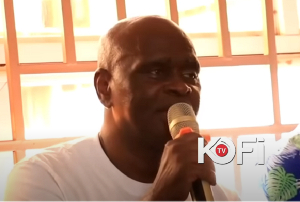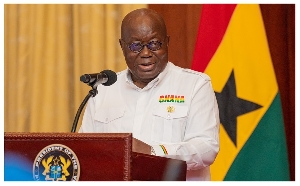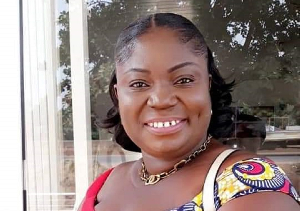- Home - News
- TWI News | TV
- Polls
- Year In Review
- News Archive
- Crime & Punishment
- Politics
- Regional
- Editorial
- Health
- Ghanaians Abroad
- Tabloid
- Africa
- Religion
- Election 2020
- Coronavirus
- News Videos | TV
- Photo Archives
- News Headlines
- Press Release
Opinions of Thursday, 14 September 2006
Columnist: Tsikata, P. Y.
Can Our Governement Stand Up For Us?
…’justice delayed is justice denied’
Indeed, the president of the Gambia, Yahaya Jameh, must account for the atrocious slaughter of Ghanaian immigrants in his country about a year ago.When I wrote the commentary: the immigration debacle, human rights and our national identity’, accessible at: www.ghanaweb.com/GhanaHomePage/features/artikel.php?ID=93358 - 23k -, I knew exactly why I meant the callous leader, Yahaya Jameh, should be held accountable for the ruthless executions.
In a heart-to-heart conversation with a Gambian friend I met in New York sometime ago, I concluded, The Gambian President, Yahaya Jameh, be held accountable without rendering public the nitty-gritty of what I discovered.
The details, for many readers, as exposed by the Gambian Echo (Raleigh) in its September 10 2006 edition may be too repugnant and very much despicable. But for some of us who cared to know the crux of the matter, this is just a corroboration of the incident by a local media.
It is sad, indeed, that the Ghanaian government could not offer any tangible explanation to Ghanaians about this vicious, irrational and cold-blooded murder of its citizens in a foreign country till now.
Does that make you a proud Ashanti, Ewe, Ga, Dagomba, or at the political level an over-enthusiastic supporter of the NDC, NPP or CPP, among others? I think it rather makes you a sad Ghanaian who, in his/her closet, will reflect soberly about what he/she means to the nation Ghana, as an individual. It could happen to you, a family member, or a close relation tomorrow.
My reflections on my time in Zimbabwe in the 1990s are still embellished with mixed sensations. I had a wonderful time in Zimbabwe, and still feel very nostalgic about it. But one issue which had always troubled me since leaving Zimbabwe was the number of Ghanaians and other West Africans who were stranded in that country after their abortive attempts to enter South Africa, Botswana and Namibia, deemed well-performing economies as compared to their counterparts on the continent.
While some of these individuals where languishing in Chikurubi Maximum Security Prison in Harare for overstaying their visas or for other immigration offences, others had to always deploy very shrewd schemes to outmaneuver agents of the security forces who were always on their heels. Mind you Zimbabwe was a police state (I am oblivious of what policing in that country is today with the economic meltdown), as compared to the porous nature of immigration borders and policing in many countries across the continent.
Although it was heartening that the Ghana mission in that country deployed many initiatives to facilitate the return of some these individuals, there were a few snags in my own estimation of the situation. There numbers were significant; placing financial constraints on what assistance the mission could offer to those stranded. Two, if that endeavor would not encourage others to also take the risk believing there is assistance wherever they decide to head. And three, whether any intervention would be worth the price/effort, as some may simply return in days with the mind-set ‘no pain no gain’ in their psych
The current event cannot be treated in isolation. The vicious execution of 10 Ghanaian ‘shoe-shine’ boys, purported to be Ghanaian mercenaries seeking to oust the then Togolese president should still be fresh on our minds.
Of course, there are important differences in the two eras within which these individuals were killed; but as it were, the basic assumption on which they were executed, juxtaposing the two scenarios, had been their alleged attempt to overthrow their host governments.
The watershed, however, is that in the first instance, while both governments-the Ghanaian and their Togolese counterpart-were both military regimes with well-known tensions and bellicosities on both sides, that could not be said in the current situation. Both administrations, in the current circumstance, are deemed democratic. Placing a great deal of responsibility on them to respect human rights, especially the right to life, to the hilt.
Though not an expert in international relations, it is not impervious to logic that one would assume that the current democratic dispensations of the two countries, unlike in the Togolaise killings, predispose them diplomatically towards a state level discourse in the spirit of international pacts, especially Ecowas protocols, which should have yielded public disclosures of what really transpired by now.
But contrary to this expectation, one year on investigations are still in the loop and business is as usual, with the Ghanaian authorities and their Gambian counterparts still unable to inform the families of the victims and the Ghanaian public anything of substance, which should pave the way for compensations from the ersatz democratic regime in the Gambia.
The question, however, remains whether our pacifisms, as a nation, prevent us from employing strategic measures to demand accountability from individuals, corporate entities and states taking advantage of the vulnerability of our citizens in foreign lands and abusing them? Or is it just a matter of dereliction on the part of state machineries, especially the Foreign Ministry and the High Commissions and Embassies, not playing their roles effectively?
Now, I don’t think that there is any gainsaying in asserting that the Ghana government needs to revisit the Ecowas protocol A/P. 1/5/79 paragraph 2 of Article 27 with its subsequent revisions, with the view to proposing some amendments that would offer realistic securities to her citizens entering other West African countries, considering the spate of sub-regional mobility at current levels.
Finally, Ghanaians should end their daydreams in the philosophy of reciprocity thinking that because their country offered and continue to offer sanctuary to many African nationals from war-torn countries and other stable countries, they will receive reciprocal treatments wherever they are. It hardly works like that these days. People should take their time to find out about countries they plan to migrate to before taking the risk.
Please keep the comments discreet, non-political and devoid of ethnocentric sentiments.
Entertainment










